Articles and Essays by ALON HELLED
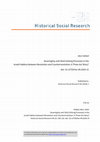
Sovereignty and (De)Civilizing Processes in the Israeli Habitus between Revolution and Counterrevolution: A Three-Act Story?, 2024
Sovereignty can be conceptualized in several fashions, as it consists in the definition of both l... more Sovereignty can be conceptualized in several fashions, as it consists in the definition of both legal and institutional power relations within and among political systems. This internal\external duality is especially true in the case of Israeli political and legal culture. The exilic features that had once characterized Jewish identity were gradually transformed into a national collectivity. In this sense the sociogenesis of the Jewish State was the result of both civilizing and decivilizing processes. The secularization of “Jewishness” emulated the political order adopted by non-Jewish societies and thus brought to its nationalization. Not only did it entail a spatiotemporal and institutional autonomization, whose trajectory was to legitimize the idea of an independent Jewish nation-state amongst the system of modern nation-states, but it also implied the construction ex novo of legal and institutional frames originating in Jewish and European traditions. This essay, inspired by Eliasian figurational sociology, historically traces and empirically discusses different aspects of Israeli statehood as an expression of Jewish nationhood and state sovereignty. It emphasizes the dialectical interconnections between legal and societal processes in the formation of Israel’s national habitus. The enquiry focuses on the country’s juridico-political changes in light of three major events: the 1948 Declaration of Independence, the so-called Constitutional Revolution, and the Basic Law: Israel as the Nation-State of the Jewish People. By using a historical and sociological analysis, Israeli sovereignty reveals its structures, contradictions, and transformations.
Israel Studies is a rather recent and fragmented discipline in the Italian academic system. Nonet... more Israel Studies is a rather recent and fragmented discipline in the Italian academic system. Nonetheless, the interest in Israel's geopolitical history has progressively emerged from Middle East and International Relations scholars as well as from some nonacademic actors seeking to understand the Israeli-Arab conflict and later on Israel's own sociopolitical complexity. Universities such as Venice and Pisa include Israeli history in various academic curricula while Florence University offers a specific course on Israel's History. The article reconstructs the development of Israel Studies in Italy by examining the decentralized academic dynamics and by contextualizing it within local academia and society.
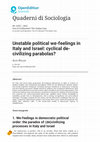
Unstable political we-feelings in Italy and Israel: cyclical de-civilizing parabolas?, 2022
Do Italy and Israel attest progressive de-civilizing phenomena in light of erosion in political s... more Do Italy and Israel attest progressive de-civilizing phenomena in light of erosion in political stability and institutional paradigms? What are the differences between Italian and Israeli imperfect statehoods, revealing fluctuant tendencies in democratic civilizing and de-civilizing processes? Despite historical, political and sociological differences, both Italian and Israeli democracies have shown signs of political unrest and segmentation. The interaction between state and citizenry, anchored to national we- feelings, transformed the two countries into nation-state-based democratic republics which remain susceptible to instability, maybe even to disintegration, due to lasting sociopolitical and socio-cultural cleavages. The paper analyses the two states, and the democratic challenges they face, by using a long-term figurational analysis concerning three socio- historical properties that define their collective “self”: 1) the nation-state model; 2) democratic regime; 3) republicanism.
When Nations Adapt: National Resilience between State(s) and Identity(ies) by Helled & Pala, 2023
Nations are resilient and often taken for granted as an analytical category in most social scienc... more Nations are resilient and often taken for granted as an analytical category in most social sciences. Academic literature has highlighted the industrial and capitalistic origins of nationalism, espousing the formation of modern statehood as well as the revitalized re-elaboration of ethnogenetic elements into that same modernity, even when 'imagined' and 'invented'. Certainly, the organizational and ideological capacities of nation-states are sociologically 'grounded', yet less attention has been given to nations' capacity to adapt their sociogenetic identity. This article seeks to interpret and contextualize the issue through the theorization of national resilience as a midrange concept by offering analytical instruments.
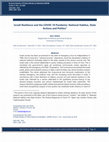
Israeli Resilience and the COVID-19 Pandemic, 2022
Israeli society has been accustomed to the state of emergency since its independence in 1948. Due... more Israeli society has been accustomed to the state of emergency since its independence in 1948. Due to long-term ''national-security'' imperatives, Israel has developed a habitus of national resilience intimately linked to the state, viewed as the utmost survival unit. The Israeli state is the central stakeholder in policy-making processes in times of crisis. This is translated into government's rapid, yet sometimes controversial, modus operandi, as reflected by the emergency of COVID-19 pandemic. The Coronavirus has entered the Israeli public sphere and activated citizenry to fight a silent frontless war whose frontline remains undefinable. The article addresses the conjunctural and structural combination of the sanitary emergency, the political crisis, and the increasing social discontent in Israel. It commences with a short definition of habitus, survival unit and national resilience in the Israeli case, followed by e section dedicated to the qualitative process-tracing of key decision-making moments and actions implemented by Israeli state authorities. The enquiry therefore juxtaposes health-related and political-based ventures while providing a multi-level sociopolitical analysis of how politics has mobilized Israeli citizenry in times of a twofold crisis, namely the Covid-19 pandemic and the country's political unrest. The article ends with evaluation and hypotheses regarding Israel's strategy to face the ongoing sanitary threat, the possible political shifts, and the impact of the multifaceted crisis on Israel's sociopolitical fabric.
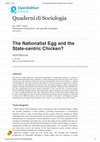
The Nationalist Egg and the State-centric Chicken?, 2020
The book by Siniša Malešević, Grounded Nationalisms: A Sociological Analysis, is useful for bette... more The book by Siniša Malešević, Grounded Nationalisms: A Sociological Analysis, is useful for better understanding the social conditions in which nationalism has come into being. The volume is based on a rich overview of literature and is accompanied by several case-studies (i.e. Ireland and the Balkans). The analysis stresses the utility of a long-run processual approach in order to contextualize the nationalist grip in modern society. By tracing changes in states' organizational capacity, ideological penetration and networks of micro-solidarity, Malešević's demonstrates how and why nationalism has become deeply "grounded'' in the everyday life of modern human beings. Following Malešević (2019), this critical note seeks to juxtapose the former's thesis with two other recently published books: Why Nationalism (Tamir, 2019) and Sovranità (Galli, 2019) in order to shed light upon the somewhat ambiguous triad nation-state-sovereignty as addressed by these three different authors. The aim is to elucidate "dark spots" and bridge over gaps regarding the socio-political interpretation of the "nation'' as an omnipresent societal category.

The Nationalist Egg and the State-centric Chicken?, 2021
The Nationalist Egg and the State-centric Chicken? Social scholar Siniša Maleševic´, Chair of Soc... more The Nationalist Egg and the State-centric Chicken? Social scholar Siniša Maleševic´, Chair of Sociology at the University College, Dublin has recently published a book, entitled: Grounded Nationalisms: A Sociological Analysis, which is rich of interesting question marks about the fashions in which nationalism has come into being and the reasons for its sociopolitical and sociocultural predominance in contemporary society (Maleševic´, 2019). The book, published by the prestigious Cambridge University Press, posits the author in line together with those to whom he owes much of his intellectual training (his teacher Ernest Gellner in primis) 1. Nonetheless, despite the somewhat natural appreciation, even accolades, the author and book may receive, the content of the book deserves careful scrutiny without necessarily looking at Maleševic´'s academic pedigree. Maleševic´ displays, using his own words, that «the strength and worldwide proliferation of nationalist ideologies is firmly linked with the character of social organizations, the scale of ideological penetration and the depth of the micro-level solidarities that shape specific nationalist habitus» 2 (Maleševic´, 2019, 15), hence, a sociological explanation well-rooted in a historically grounded long-term empirical analysis. The latter thus means to challenge the existent predominant interpretations of nationalism, namely the purely modernist, either materialist or subjectivist, and the primordialist ethno-symbolist, while arguing that national identities are a contingent historical product of the specific organizational, ideological and micro-interactional processes that have molded the world over the last three centuries.
The 2015 Israeli general elections provide rare intellectual stimuli to trace and characterize so... more The 2015 Israeli general elections provide rare intellectual stimuli to trace and characterize some of the larger sociopolitical stances in Israeli society. Since Israeli politics has undergone many changes over the last decades, a focus on electoral moment unpacks the issues and general perception regarding geopolitics (i.e. the Israeli-Palestinian conflict) and the domestic health of the country (i.e. sociopolitical reforms and policy-developments). This paper aims at analyzing the three main dimensions, which were emphasized during the electoral campaign and the turnout, while it connects them with what we may refer to as the Israeli political "state of mind”.
Keywords: Israel, elections, security, discourse, leadership
Helled, A. ‘French Populism and Anti-Europeanism: The two souls of the République’; The Federalis... more Helled, A. ‘French Populism and Anti-Europeanism: The two souls of the République’; The Federalist Debate, Year XXVII, No. 3, November 2014, pp. 49-52.
Some considerations regarding the perplexing populist phenomenon in France.
Conference Presentations by ALON HELLED
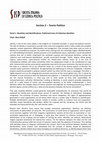
Identity is one of the crown jewels in the kingdom of 'contested concepts' in social and politica... more Identity is one of the crown jewels in the kingdom of 'contested concepts' in social and political sciences. The idea of identity is conceived to provide some unity and recognition while it often entails the complete opposite, namely separation, differentiation and antagonism. Few concepts have been used as much as identity for contradictory purposes. No matter what, starting from the seemingly fragile individual identity as a self-solidifying framework, identity presents us its multifaceted nature, especially in social and political sciences that aim to better understand the socialized in-group and inter-group identities, namely the collective and multi-layered identification, socially constructed through family, religion, ethnic group, regions, nation-states, supra-national entities etc. Politics-wise, identity shows up in the core of contemporary debates and makes everything either too dangerously simple or too complicated to cope with. Constructivist and de-constructivist approaches have led to the same conclusion: the eternal return of the topic as a relevant, not to say influential, factor. As a result of the diverse aspects of identity, the concept needs continuous refinement. By approaching and addressing its inherent complexity, a dynamic analysis should be provided in political research (which has often left the issue to sociology). The latter is highly required vis-à-vis the changing and uncertain outcomes of the recent global crisis. Yet, it cannot be trivialized. It must commence with two dialectical interrogatives: 1. if identities are socially constructed and are not natural formations, in what way and to what extent do they hold responsibility for inclusion\exclusion, self-other dichotomies? Looking at identities in social research provides explanatory tools for a wide variety of events and socio-political dynamics to be better contextualized; 2. Since identities reflect the complex nature of human societies and engender far-reaching processes (e.g. shifts in political regime, armed conflicts etc.), what are the dynamics between the former and politics? That said, studying identities usually generate reasonable comprehension for processes that cannot be explained by tracing pure rational driven pursuit of interests. The feelings of attachment, belonging, recognition, the processes of values' formation and norms integration, the logics of appropriateness generated in social organizations are all arenas which rely on a certain type of identity or identification. Multiple identifications overlap, interact, include or exclude, conflict or enhance trust and cooperation. Identities create boundaries and borders; define the in-group and the out-group, the similar and the excluded, the friend and the foe, the 'self' and the 'other'. Beyond their dynamic fuzzy nature that escapes exhaustive explanations, identities are effective instruments of politicization of social life. The construction of social forms of organization and of specific social practices together with their imaginary significations requires all the time an essentialist or non-essentialist legitimating act of belonging; a social glue that extracts its cohesive function from the identification of the in-group and the power of naming the other. Identities are political. Multicultural slogans populate extensively the twenty-first century. Yet the distance between the ideal and the real multiculturalism persists while the virtues of inclusion coexist with the adversity of exclusion. Thus dealing with identities means to integrate contestation into context. Due to the confusion between identities and identifications some scholars have demanded that the concept of identity should be abandoned. Nonetheless, identity-related issues keep emerging out of political discourse, as identity-based claims have
Book Reviews by ALON HELLED

Daniele Conversi published a short and instructive volume on the relations between climate change... more Daniele Conversi published a short and instructive volume on the relations between climate change and politics. Conversi puts on the table the interconnections between climate change, the apex of many other environmental disasters, and the world of nationalist politics, with the latter being anchored to predominant nation-state logics, even in the face of planetary challenges. In four chapters, the author addresses the 'climate change science' and sociopolitical responsibilities pertinent to the nation-state. He asserts that a state of 'collective stupidity' (p. 6) and the clouding of intellectual faculties, pushed aside by mediatic mainstream, have engendered a sort of alarmism and, at the same time, a refusal to rethink economic growth or liberal capitalistic development. The phenomenon of skeptical deniers' tautological distortion of scientific evidence has hindered the effective governance of planetary problems. This lack of political response has led to the expansion of regional tipping points tending to become global ones. As the regional transforms into global, with no sufficient measures taken by policy-makers, this process poses high risk to the planet, given the unpredictable cascading effects it originates. Conversi uncovers the triadic reality of interconnected scientific, social, and state-nation political dimensions, while advocating for the need to adopt a transdisciplinary science to address climate change. His position implies that science may not necessarily be democratic in the production of knowledge. However, it requires democratic transparency in order to disseminate that knowledge and, consequently, provide means of pressure on politics. In the first chapter, Conversi historicizes the first development of scientific environmental studies and the first signs of ecological consciousness, initiated in the 1970s (Earth Day, Green Peace, the 1972 Limits to Growth Report, etc.), that showed the fallacies of the dominant Western economic model. As neither interest, nor concrete action had been taken by states during the Reaganian years of so-called 'devolution', the role of nation-states in the developed world regarding greenhouse gas emissions was only conceptualized in 1992 (with no public funding). Yet, the two conflicting paradigms, that is, no limits to development and economic growth vs. anthropogenic responsibility, remained unbridgeable. The second chapter introduces the biopolitical dimension, inspired by Bruno Latour, of contemporary emergencies. As asserted by Conversi, climate change is the corollary of conflicts, pandemics, wars, poverty droughts (e.g., Syria, Somalia, Sudan, etc.) which are consequential to soil depletion, desertification, and deforestation, acidification of the oceans, extinction of species, and so on; up to the demographic pressure of 'climigration' of masses from sub-Saharan Africa to Europe (p. 26). Here, the author posits the challenge of the denationalization of both politics and policies worldwide. This is the core reflection of Conversi's book. Global phenomena, such as mass consumerism, the overpopulation of the planet, pollution of chemical and\or radioactive isotopes from nuclear scoriae, all impact climate change and the emergencies deriving from it. These have thus far been ignored by political studies on nationalism. According to the author, humanity finds itself in a new age, that is, the Anthropocene. The latter refers to the geological

Memory activism: Reimagining the past for the future in Israel-Palestine, 2021
drugs trade and the current sources of funding for Shan insurgent groups. Unfortunately, this mea... more drugs trade and the current sources of funding for Shan insurgent groups. Unfortunately, this means that the linking of the findings, to the ambitious conclusion that Shan nationalism is influenced by antinarcotic ideology, represents quite a generalisation, as despite contributing a good deal of original information, whether in terms of the political analysis or the interviews, it fails to convince the reader that this could be applied across all the Shan people. Be this as it may the book still offers an interesting study of a community in the borderlands and on a grander scale, this study outlines a new approach to ethnic politics and identity, with the potential for an expanded investigation. As such, this text will be of interest to scholars of Southeast Asia and ethnic conflict, tracing as it does a key aspect of the insurgency throughout changing conditions.
Israel’s regime untangled: between democracy and apartheid by Gal Ariely, Cambridge, Cambridge University Press, 2021, 230 pp., $117 (hardback), index, ISBN 978-1-108-84525-0, 2022

The Jewish Contribution to European Integration By Sharon Pardo and Hila Zahavi (Eds.). Lanham: Lexington Books, 2020. 196 p. € 92 (hardcover) Book Review, 2022
edited a volume which is a mosaic of ideas and angles about and around contemporary Europe and Eu... more edited a volume which is a mosaic of ideas and angles about and around contemporary Europe and European Jewry. Both Israeli political scholars, members of the Simone Veil Research Centre for Contemporary European Studies at Ben-Gurion University of the Negev, selected contributions from different scholars and practitioners of EU politics and Jewish affairs. The viewpoint adopted by the editors is resumed by the twofold assumption that, on the one hand, 'Jews were viewed by some as representing Europe's first supranational and multicultural entity' (p. 1), depicted as the prototypal model of liberal cosmopolitan Europeanness. On the other hand, however, Jews are Europe's archetypal minority, a primordial otherness in a historically Christian[ized] European society which had eternalized the pejorative label of the so-called 'juif errant' (the wandering Jew who has the wrong faith and no land). This dual prism, implying an abyssal distance between these two perceptions of Europe−Jewry relations is the challenging debate the volume seeks to disclose. According to the editors, European Jewry would profitably serve as interreligious and intercommunity mediators between European Islam, as a growing novel minority, as well as '"as a broker"' (p. 4) of expectations and dialogue with Israel, insofar as EU Jewry contributed in the past and present to the European Union's pluralism, whilst fulfilling the biblical Jewish aspiration of being "light unto the nations" (p. 5). Yet, these programmatic role is ambiguous and contradictory inasmuch as it is as universal as particularistic with regard to any identityrelated policy European governance may ever endorse. The volume, the outcome of three international workshops, is divided into three parts: 1. Present Challenges; 2. Jews and the Pan-European Identity; 3. Unsung Heroes, and ends with a rather short epilogue (pp. 177-1983). It contains 13 chapters, contributed and often readapted by scholars such as Sergio Della Pergola (Ch. 2) and Dani Filc (Ch. 3), speeches carried by politicians, namely Romano Prodi (in his capacity of President of the European Commission; Ch. 6) and Emmanuel Macron (the President of France tribute to Simone Veil; Ch. 13) and practitioners such as Spanish diplomat Alvaro Albacete (Ch. 7), former German Ambassador Hubertus von Morr (Ch. 11) and others. The first part of the volume is rather disorganic. Della Pergola outlines the trends in Jewish demographics in Europe, followed by Filc's contribution. The latter uses the definition of exclusionary Populism, which is a populist form advocating for the ethnically organic state-based sociopolitical unitnamely the admixture of ethnos and demos-, whose colonialist echoes in European ideological nativism are indeed indisputable. However, his contribution does not make reference neither to Jews living in Europe, nor to the level of EU institutions. Beyond the fundamental characteristics of Western European populism, e.g. nationalism and xenophobia, the Europe−Jewish relationship receives no direct attention. Baneth's contribution (Ch. 4) lists EU organisms and competences and thus indirectly implies the scarce and meagre juridical cohesive nature of EU institutions to fight anti-Semitism (whose definition is taken from Wikipedia

Colin Crouch, Post-Democracy: After the Crises, Cambridge, Polity, 2020, pp. 200., 2022
Colin Crouch has published a stimulating sequel to his 2003 book Post-Democracy that is brimming ... more Colin Crouch has published a stimulating sequel to his 2003 book Post-Democracy that is brimming with poignant observations on the democratic dimension of globalized, mostly Western, societies. In this new book, the author adopts a rather innovative approach as he analyzes the weakening of democratic representation and participation in relation to the neoliberal, financial, and economic excesses leading to the 2008 crisis and its varied consequences for both the global economy and politics. The author, a Professor Emeritus at of the University of Warwick, and external scientific member of the Max Planck Institute for the Study of Societies at Cologne, reframes the contemporary societal order by deconstructing the frequently used concept "post-" (e.g. post-industrial, post-modern, post-liberal, and post-ironic). Society, Crouch asserts, "knows where it has been and what it is ceasing to be, but not where it is going […] a parabola through which the phenomenon in question [democracy] passes over time" (p. 2). This concerns the achievements, practices, and values of both institutions and individuals in formal democracies but whose real energy, in terms of autonomous popular participation and "democratic moments" (i.e., collective action shaping socio-political agendas), has significantly weakened in recent decades. As a result, democracy has become post-democracy. This is primarily due to three interlinked phenomena: (1) economic globalization and the subsequent rise of giant corporations; (2) changes to the class structure of Western democracies as well as the decline of religion (forces providing ordinary people with political direction and identities); and (3) the tendency for politicians to neglect the public and marketize politics, preferring the company of global business elites. These are the symptoms of post-democracy. Crouch's conceptualization of post-democracy is developed in chapters 1 (What is Post-Democracy?) and 2 (Inequality and Corruption) and then historically contextualized in chapter 3 (The 2008 Financial Crisis) and chapter 4 (The European Debt Crisis). Chapter 5 (Politicized Pessimistic Nostalgia: A Cure Worse Than The Disease) discusses the outcomes of the structural crises in relation to the rise of neoconservative populism and pessimistic nostalgia. Both were enabled by the declining power of class movements and religion, as analyzed in chapter 6 (The Fate of Twentieth-Century Political Identities). The concluding chapter 6 (Beyond Post-democracy?) encourages readers to be vigilant and actively care for the integrity of unelected democratic institutions (i.e., the judiciary and international organizations (especially the EU) as well as information services, free journalism and science). This point highlights a democratic paradox, in as much as those nonelected institutions are meant to protect democracy. The defence of these institutions from political abuse, interest, and interference will only be possible if citizens actively participate in politics, as well as nurture and demand honesty and transparency. Civil society also has to revive democracy at the international level, since international cooperation is needed to extract taxation from globalized corporate giants, protect the climate from speculative international finance, etc. Throughout the book, Crouch emphasizes that the essence of democratic public life has been significantly undermined by small elites of politicians and the corporate rich. Nowadays, the dominant politico-economic ideology, i.e., neoliberalism, has left democracy to complacency, endemic corruption, and increasing economic inequality. Most of these phenomena have emerged from the growing temptation of the political class to cluster around the business elite. One result of the interlock between socio-political and economic interests has been to engender a "revolving door" through which business magnates lobby politicians and former politicians and high-rank public officials make their
Grounded Nationalisms A Sociological Analysis, 2019
Book Chapters by ALON HELLED
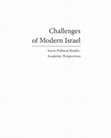
Challenges of Modern Israel Socio-Political Reality: Academic Perspectives, 2022
Contrary to more intuitive cases of populism, Israel presents a mixture of ethno-cultural and pol... more Contrary to more intuitive cases of populism, Israel presents a mixture of ethno-cultural and politico-religious features making the “populist label” ambiguous, yet inherent to Israeli statehood. Israel’s socio-political fabric is contextualised within a long-term process that facilitates the emergence of the populist syndrome. Chronic and omnipresent rather than occasional and abrupt, Israeli populism is a complementary instrument in the country’s politics, since it bonds nationalist claims with democratic discontent. By tracing Israel’s “survival unit”, its foundational ideology, i.e., Zionism, and the republican vessel of Mamlakhtyiut containing it, the chapter situates populism on the scale of nation-building and uncovers its role as a figurational implement in the construction of Israeliness.
Keywords: populism; Mamlakhtyiut; nation-building; Israeli statehood; survival unit.







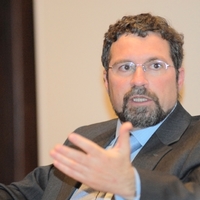



Uploads
Articles and Essays by ALON HELLED
Keywords: Israel, elections, security, discourse, leadership
Some considerations regarding the perplexing populist phenomenon in France.
Conference Presentations by ALON HELLED
Book Reviews by ALON HELLED
Book Chapters by ALON HELLED
Keywords: populism; Mamlakhtyiut; nation-building; Israeli statehood; survival unit.
Keywords: Israel, elections, security, discourse, leadership
Some considerations regarding the perplexing populist phenomenon in France.
Keywords: populism; Mamlakhtyiut; nation-building; Israeli statehood; survival unit.
Figurational Approaches to the Problems of the Twenty-First Century'', Florence Delmotte • Barbara Górnicka (Editors)